#Dutch Famine
Text
Hunger Winter and Operation Manna & Chowhound
One might be forgiven to think that the picture above is from a very impoverished country, but it is not. In fact it is a picture from a family living in one the wealthiest countries in the world. Even during World War 2, the Netherlands was still a wealthy country, albeit that not all the wealth was distributed to its citizens. The picture was taken during the winter of 1944/45, known as the…

View On WordPress
#Audrey Hepburn#Dutch Famine#Famine#Famine relief#History#Holocaust#Manna#Operation Chowhound#Operation Manna#the Netherlands#World War 2
0 notes
Text
I just heard that there are people planning to protest during 4 May against Israel. As a Dutch woman of Roma heritage, I AM FUMING.
To those who don't know: 4 May is national memorial day in the Netherlands where we remember those who died during WWII.
Whilst I find you anti-semitic fucks who are villifying every Jew in existence for what's currently happening in Israel to be awful - targeting 4 May when that day is for EVERY minority hunted down during WWII means you are targeting ALL of our communities.
Remember how I mentioned that during my final year of elementary school I had a hag of a teacher? I literally remember arguing with her about how the history books barely talk about us. The REAL estimated number of deaths could have been as high as 1,5 MILLION Roma unlike the reported '400K' you'll find in your history pages.
I have seen in YouTube videos from Americans and Canadians how they solely talk about the Jews and are trying to make it about black people with the unproven historic sentiment that Jewish people originally were black. I've even heard statements written out loud from American musea who only mentioned us like a footnote before talking about black people in length. Reported numbers of black people castrated/killed during WWII were a couple of thousand because that's how few black people there were in Europe.
The Roma are the biggest racial group hunted down during WWII, stop trying to take that away from the potential million people that died! Give their souls the respect they deserve. How sick in the head do you have to be to be like, 'This major genocide has to be about MY race'- when the actual group hunted down for their skin and culture wasn't yours.
My deadbeat dad and his sisters are more lily white looking as I always call it, but grandpa was a bit more Roma looking like me and my late grandma did make a few implied statements that it was his father who had a Romani mother.
That was during WWII. My great-great grandmother likely was an elderly lady hunted down like a rat during this period. The fact my paternal family didn't had any pictures of my great-grandfather unlike his wife, worries me but it's too heavy of a subject to talk about with relatives that I have a strained relationship with. How can you make that about you? Tell me!
Another one of my great-grandfathers wasn't a member of the Resistance but he did help out with food smuggling. Ever heard of the Dutch famine during WWII? My great-grandfather tried to keep regular Dutch citizens alive and was willing to stick his neck out as one of the richer families of the area to help the lesser priviliged and he was publically beaten for it by the Nazis as an example for the townsfolk. He's the only male relative I am proud of to be related to, because that was an act of bravery and generosity worthy of praise.
Not every wealthy white man is a greedy devil, my great-grandfather proved that.
As much as I hate Frank Timmermans (Dutch politican), I do agree with his statement that you can protest on every fucking day of the year- just not memorial's day.
This day belongs to so many non-Jews too and making this about Israel is just overshadowing the other victims once more.
We haven't done anything to deserve to get erased. Yet the media, history books and non-Roma do that very thing. In my own personal experience, even the gays are mentioned more often then we are. The only group that might be more forgotten then we are, are the disabled.
And as an autistic individual that also earns my ire.
I can bet my ass off that none of those sickening protesters would have been hunted down if we lived during WWII, unlike me. I have to live with that and the handful of people throughout my life who did call my blood impure.
LEAVE 4 MAY ALONE!
#tetsutalk#4 may#4 mei#wwii#jews#roma#roma erasure#romani#romani erasure#israel#don't target the victims of wwii- they were more then just Jews#millions of non-Jewish people died in my country#remember the Dutch famine?
3 notes
·
View notes
Text
The Dutch lore about St. Nicholas, who brings Dutch and Belgian children presents on Dec 5th (Netherlands) and 6th (Belgium) tells us the 'good, holy man' (he's a bishop) lives in Spain. And I know it's February so who cares but hear me out.
In the winter of 1944-1945 the part of The Netherlands not yet liberated by the Allied troops who landed on D-Day were suffering a terrible famine - the Hunger Winter. In that light, the Spanish Red Cross made a donation of 2000 tonnes of oranges to the Dutch Red Cross, to be given to Dutch schoolchildren.
On one of the pallets was written:
Sender: "Saint Nicholas, Spain"
Saint Nicholas sent Dutch children famine relief I'm... 😫😭
Because Saint Nicholas, as all Dutch children are told, will always have their backs 😭😭😭
0 notes
Text
#everyone go look up the Great Bluebell Famine of 2015 right now#I was eating Dutch chocolate bluebell a minute ago which inspired this#anywho#look I made a poll!#sav speaks
1 note
·
View note
Text
Our live coverage from Gaza will shortly be closing until tomorrow morning.
Here are the day's key developments:
The Israeli army has killed more than 15,000 Palestinian children in its eight-month-long war on Gaza, mostly students, the Palestinian education ministry said on Tuesday.
The Palestinian government in Gaza has accused Israel of inciting chaos after Israeli forces killed eight police officers in their latest attack
A South African man appeared in court on Tuesday accused of stabbing to death a mother and of wounding her husband and son because of the family's pro-Palestinian views
US President Joe Biden has told Time magazine that people have "every reason" to believe that Israeli Prime Minister Benjamin Netanyahu is prolonging the war in Gaza for his reasons of self-preservation
The World Health Organisation (WHO) has warned that 7,000 to more than 11,000 Palestinian patients need immediate medical evacuations from the Gaza Strip
Dutch Prime Minister Mark Rutte has called on Israel, saying that it must abide by the International Court of Justice’s order to halt the offensive on Rafah
The Israeli war cabinet minister Benny Gantz says hostilities on the northern border with Hezbollah will be dealt with by September “whether by [diplomatic] arrangement or [military] escalation”
Palestinians in Gaza are increasingly resorting to desperate measures in a bid to stay alive, the regional director of the World Health Organisation said on Tuesday
The Slovenian parliament approved the recognition of an independent Palestinian state with a majority vote on Tuesday, following in the steps of Spain, Ireland and Norway
The House approved legislation on Tuesday seeking to sanction the International Criminal Court for its move to issue arrest warrants against Israeli leaders for their conduct in the war on Gaza
An independent group of experts warned on Tuesday that it's "possible, if not likely" that a famine is underway in northern Gaza
#Palestine#free Palestine#free rafah#all eyes on rafah#rafah#gaza#free gaza#genocide joe#current events#news
68 notes
·
View notes
Text
There are men in my friendship circles who I don’t bother to argue with (pretty much all men I don’t argue with at this point tbh unless it’s to defend a woman) because I know they don’t respect women or me enough to even be worth that. But I always forget the extent of men’s hatred and disrespect even in mainly civil, friendly relationships. This guy I know is always smiling and nice to me but is so disrespectful to me when I argue with him so I keep things superficial. But the other day I read something in an article that I found interesting so I brought it up, nothing too controversial (It was about the whole thing about Dutch people being more predisposed to obesity after the famines of World War II and their epigenetics). But it was something he hadn’t heard of before and he kept interrupting me, smirking to tell me how impossible it was and how I must have simply made it up or read it somewhere disreputable. I was like “Name any scientific journal and I’ll show you a source.” And I did and then he smiled and said “You read one article and you think you know everything.” I told him he was being condescending and got upset and he was like “Yeah I was being condescending but you made this conversation heated by getting upset with me for that.” It goes to show that you don’t even have to initially argue with a man for him to despise you and be condescending, any sort of new information brings out that uniquely misogynistic contempt and amusement. It really reminded me of my dad and brother especially growing up. Anyway ladies avoid interactions with men at all and especially men who think it’s adorable you have any opinions or independent thoughts of the world.
341 notes
·
View notes
Text
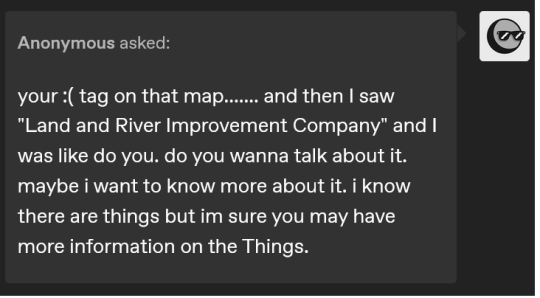
It's a big mess of hubris; the manipulative use of scientific language to legitimate/validate the status quo; Victorian/Gilded Age notions of resource extraction; the "rightness" of "land improvement"; and the inevitability of empire.
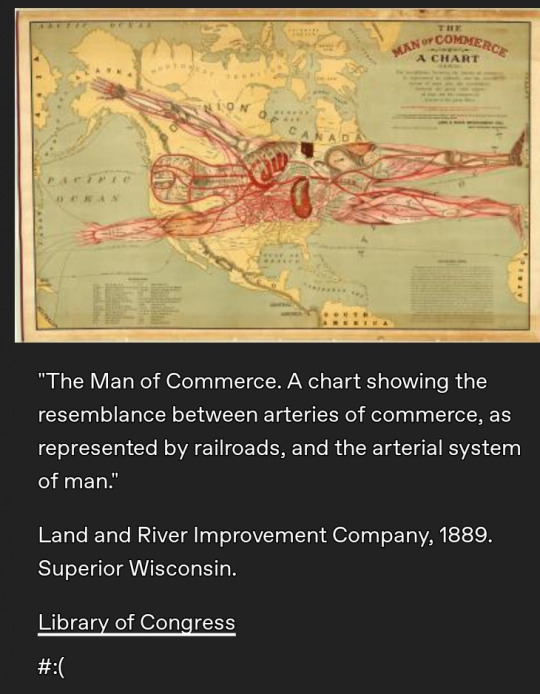
This was published in the United States one year before the massacre at Wounded Knee.
This was the final year-ish of the so-called "Indian Wars" when the US was "completing" its colonization of western North America; at the beginning of the Gilded Age and the zenith of power for industrial/corporate monopolies; when Britain, France, and the US were pursuing ambitious mega-projects across the planet like giant canals and dams; just as the US was about to begin its imperial occupations in Central America and Pacific islands; during the height of the "Scramble for Africa" when European powers were carving up that continent; with the British Empire at the ultimate peak of its power, after the Crown had taken direct control of India; in the years leading up to mass labor organizing and the industrialization of war precipitating the mass death of the two world wars.
This was also the time when new academic disciplines were formally professionalized (geology; anthropology; archaeology; ecology).
Classic example of Victorian-era (and emerging modernist and twentieth-century) imperial hubris which implies justification for its social hierarchies built on resource extraction and dispossession by invoking both emerging technical engineering prowess (trains, telegraphs, electricity) and the in-vogue scientific theories widely popularized at the time (Lyell's work, dinosaurs, and the geology discipline granting new understanding of the grand scale of deep time; Darwin's work and ideas of biological evolution; birth of anthropology as an academic discipline promoting the idea of "natural" linear progression from "savagery" to imperial civilization; the technical "efficiency" of monoculture/plantations; emerging systems ecology and new ideas of biogeographical regions).
While also simultaneously doing the work to, by implication, absolve them of ethical complicity/responsibility for the cruelty of their institutions by naturalizing those institutions (excusing the violence of wealth disparities, poverty, crowded factory laboring conditions, mass imprisonment, copper mines, South Asian famine, the industrialization of war eventually manifesting in the Great War, etc.) by claiming that "commerce is a science"; "pursuit of profit is Natural"; "empire is inevitable".
This tendency to invoke science as justification for imperial hegemony, whether in Britain in the 1880s or the United States in the 1920s and such, might be a continuation of earlier European ventures from the sixteenth to eighteenth centuries which included the use of cartography, surveying/geography, Linnaean taxonomy, botany, and natural history to map colonies/botanical resources and build/justify plantations and commercial empires in the Portuguese slave ports, Dutch East Indies, or the Spanish Americas.
Some of the issues at play:
-- Commerce is "A Science". Commerce is shown to be both an ecological system (by illustrating it as if it were a landscape, which is kinda technically true) and a physiological system (by equating infrastructure/extraction networks with veins) suggesting wealth accumulation is Natural.
-- If commerce/capitalism are Natural, then evolutionary theory and linear histories suggest it is also Inevitable (it was not mass violence of a privileged few humans who spent centuries beating the Earth into submission to impose the Victorian/Gilded Age state of things, it was in fact simply a natural evolutionary progression). And if wealth accumulation is Natural, then it is only Right to pursue "land improvement".
-- US/European hubris. They can claim to perceive the planet in its apparent totality (as a globe, within the bounds of extraterrestrial space as if it were a laboratory or plantation). The planet and all its lifeforms are an extension of their body, implying a justified dominion.
-- However, their anxiety and suspicions about the stability of empire are belied by their fear of collapse and the simultaneous US/European obsession at the time with ancient civilizations, the "fall of Rome", classical ruins, etc. At this time, the professionalization of the field of archaeology had helped popularize images and stories of Sumer, Egypt, the Bronze Age, the Aegean, Rome, etc. And there was what Ann Stoler has called an "imperialist nostalgia" and a fascination with ancient ruins, as if Britain/US were heirs to the legacy of Athens and Rome. You can see elements of this in the turn of the century popularity of Theosophy/spiritualism, or the 1920s revival of "classical" fashions. This historicism also popularized a sort of "linear narrative" of history/empires, reinforced by simultaneous professionalization of anthropology, which insinuated that humans advance from a "primitive" state towards modernity's empires.
-- Meanwhile, from the first decades of the nineteenth century when Megalosaurus and Iguanodon helped to popularize fascination with dinosaurs, Georgian and later Victorian Britain became familiar with deep time and extinction, which probably contributed to British anxiety about extinction, imperial collapse, lastness, and death.
-- Simultaneously, the massive expansion of printed periodicals allowed for sensationalist narrativizing of science.
-- The masking of the cruelty in a euphemism like "land improvement". Like sentencing someone to a de facto slow death and deprivation in a prison but calling it a "sanatorium" or "reformatory". Or calling the mass amounts of poor, disabled, women, etc. underclasses of London "unfortunates". Whether it's Victorian Britain or early twentieth century United States: "Our empire is doing this for the betterment and advancement of all mankind."
-- If an ecosystem is conceived as a machine, "land improvement" actually means monoculture, high-density production, resource extraction, concentration.
-- The image depicts the body is itself is also a mere machine (dehumanization, etc.). And if human bodies are shown to be also systems, networks, machines like an ecosystem, then human bodies can also be concentrated for efficiency and productivity (literal concentration camps, prisons, factories, company towns, slums, dosshouses, etc.). This is the thinking that reduces humans and other creatures to objects, resources, to be concentrated and converted into wealth.
And so after the rise of railroads and coal-power and industrial factories in the earlier nineteenth century, the fin de siecle and Edwardian era then saw the expansion of domestic electricity, easier photography, telephones, radio, and automobiles. But you also witness the spread of mass imprisonment, warplanes, and machine guns, etc. And in the midst of this, the Victorian/Gilded Age also saw the rise of magazines, newspapers, mass media, pop-sci stuff, etc. So this wider array of published material, including visual stuff like maps and infographics could "win over" popular perception. This is nearly a century after the Haitian Revolution, so more and more people would have been able to witness and call out the contradictions and hypocrisies of these "civilized" nations, so scientific validation was important to empire's public image. (Think: 100 years prior, everyone witnessed widespread revolutions and slave rebellions, but now the European empires are still using indentured labor, expanding prisons, and growing even more powerful in Africa, etc. An outrage.)
Illustrations like this ...
It's people with power (or people with a vested interest in these institutions, people who aspire to climbing the social ladder, people who defend the status quo) looking around at the general state of things, observing all of the cruelty and precarity, and then using scientific discourses to concede and say "this was inevitable, this was natural" and not only that, but also "and this is good".
Related reading:
Peoples on Parade: Exhibitions, Empire, and Anthropology in Nineteenth-Century Britain (Sadiah Qureshi, 2011); The Earth on Show: Fossils and the Poetics of Popular Science, 1802-1856 (Ralph O’Connor); "Science in the Nursery: the popularisation of science in Britain and France, 1761-1901" (Laurence Talairach-Vielmas, 2011); Citizens and Rulers of the World: The American Child and the Cartographic Pedagogies of Empire (Mashid Mayar); "Viewing Plantations at the Intersection of Political Ecologies and Multiple Space-Times" (Irene Peano, Marta Macedo, and Collette Le Petitcrops); “Paradise Discourse, Imperialism, and Globalization: Exploiting Eden" (Sharae Deckard); "Forgotten Paths of Empire: Ecology, Disease, and Commerce in the Making of Liberia's Plantation Economy" (Gregg Mitman, 2017); Imperial Debris: On Ruins and Ruination (Ann Laura Stoler, 2013)
Fairy Tales, Natural History and Victorian Culture (Laurence Talairach-Vielmas, 2014); Mining the Borderlands: Industry, Capital, and the Emergence of Engineers in the Southwest Territories, 1855-1910 (Sarah E.M. Grossman, 2018); Pasteur’s Empire: Bacteriology and Politics in France, Its Colonies, and the World (Aro Velmet, 2022); "Shaping the beast: the nineteenth-century poetics of palaeontology" (Talairach-Vielmas, 2013); In the Museum of Man: Race, Anthropology, and Empire in France, 1850-1960 (Alice Conklin, 2013); Inscriptions of Nature: Geology and the Naturalization of Antiquity (Pratik Chakrabarti, 2020)
#abolition#ecology#landscape#colonial#imperial#haunted#modernity#temporal#indigenous#multispecies#temporality#tidalectics#my writing i guess idk#intimacies of four continents
95 notes
·
View notes
Text
The game of the goose or goose pulling
It is said that the game of goose emerged in the Iberian Peninsula around the 12th century and from there it spread to Europe. Today, in the 21st century, it is still alive in many nations such as EH, Spain, France, Germany or the Netherlands. In fact, it was the Dutch who even brought it to North America, where it was also practiced from the 17th to the 19th century.
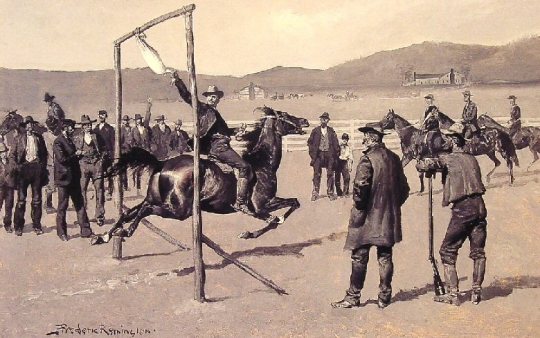
Goose pulling in West Virginia, 19th century
But what is the goose game?
First we have to know that in the Middle Ages, the goose was a symbol of everything bad: failure, plague, war, famine. Oppressed minorities such as agotes were forced to wear a red goose so that the rest would know of their pariah status. The game emerged in this symbolic context.
A live goose was tied by the legs, making it hang upside down from a rope or a pole. The initial objective was to destroy evil, and it is said that towns would pay knights to remove the head of the bird while galloping, either with their hands or with a staff.
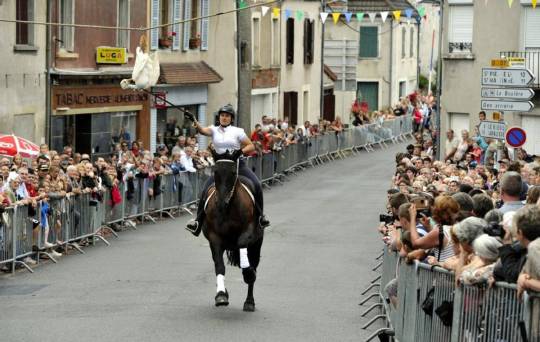
A game using a staff in Arfeuilles (France).
Little by little it evolved into a rite of passage from a child to an adult man, and no one was paid anymore, it was the young men of town who played. Needless to say, the one who actually got the head of the animal won. In EH, Pierre de Lancre banned it because he considered it was an initation to magic.
Of course the game was nothing but torture for the poor goose, so at the beginning of the 20th century it began to be considered cruel and, since its sense as rite of passage had been lost and it was only played during patron saint festivities, its popularity declined very quickly. Today, nowhere in Europe the game is played with live geese.
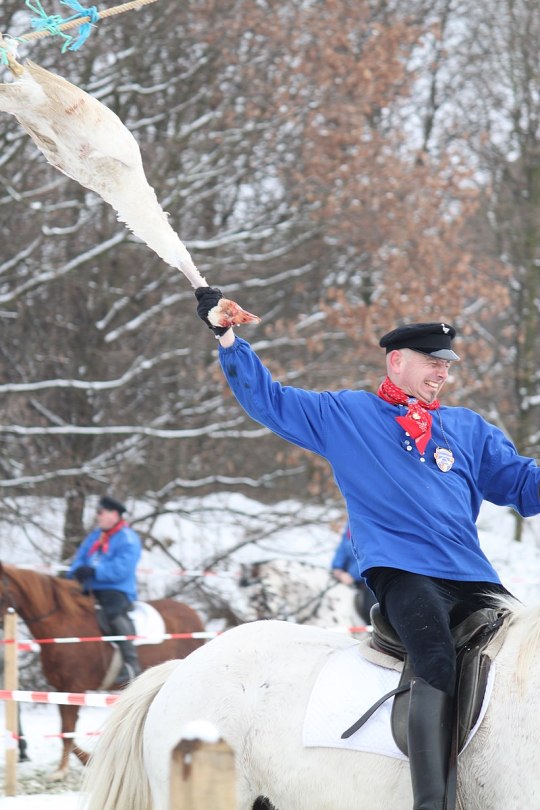
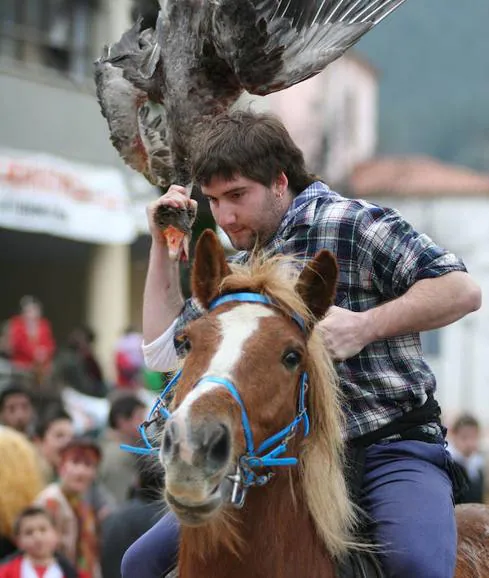
Geese pulling in Höntrop (Germany) and Markina (EH).
In EH the goose game is played every year in September and there are two types of goose pulling: the one practiced in Iparralde (in Sara, Ainhoa, Zuraide, Biriatu and Urruña) and Markina, and the one in Lekeitio, which is unique in Europe. While in Markina and Iparralde the classic game is played on horseback, in Lekeitio - known for its seafaring tradition - it is played from the water.
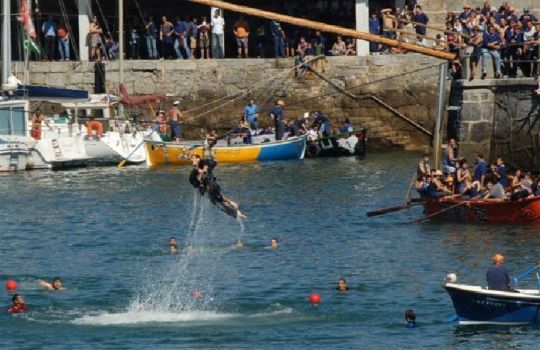
Only in this place in all of Europe the game is not played with real dead geese, but with plastic geese made specifically for the celebration.
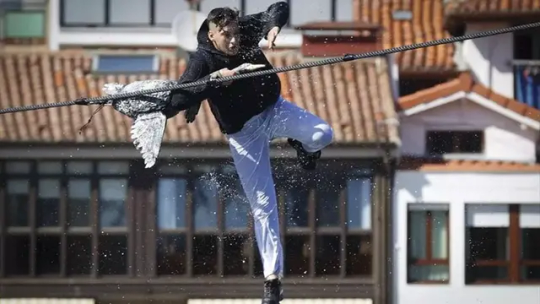
The plastic geese of Lekeitio.
Although played with dead animals everywhere but in Lekeitio - that rejected even dead geese and went for plastic ones -, it's still a controversial game. Should animals die specifically for a human game? Is it moral to destroy their bodies? Is it different from killing and cutting them up for consumption? I'd like to know your take on this ^_^
#euskal herria#basque country#pays basque#pais vasco#euskadi#culture#antzar eguna#goose pulling#game of goose#folklore#europe#lekeitio#iparralde#germany#netherlands#france#usa
28 notes
·
View notes
Text
WHAT WILL “the day after” look like in Israel and Palestine? Historically, postwar planning—dayafterism—preoccupied not only governments and businesses but also universities, as was the case throughout World War II. Scientists, too, talk routinely of “the day after.” This may, of course, just be a normal human reaction to the dread and grief of war. Or it may be an attempt to counteract war’s inherent shortsightedness, and the blinders that made it happen in the first place.
Hunger, however, which is often a corollary of war, distorts time in ways that make a mockery of dayafterism. Studies of famine teach us that hunger operates on its own timescale, regardless of political or diplomatic units of time. It does not disappear on the day a peace agreement is signed, nor when a siege is lifted. Hunger has a different temporality: it leaves scars on the body, mind, and social fabric of a community that survived starvation. Epigenetic studies of hunger show that it takes people several generations to recover from this kind of trauma. The most famous case study involves the survivors of the Dutch “Hunger Winter” of 1944–45, who struggled with various metabolic issues and heart diseases throughout their lives. Their children, born after the war, lived with elevated rates of eating disorders, schizophrenia, and kidney failure.
Perhaps we should stop indulging in easy chitchat about dayafterism as if it will be a new moment in time. There will be no postwar for Gaza. The children of Gaza will forever be marked by the duration of time they spent in “hunger-time,” when their growth was arrested by starvation, their minds marred by trauma.
-- Alma Igra, from "Hunger-Time"
18 notes
·
View notes
Text


On July 12th 1698 a small fleet of five ships set out for the Isthmus of Darien in Panama carrying Scotland's hopes of founding a new empire on board.
Some have said: 'The Darien venture was the most ambitious colonial scheme attempted in the 17th century…The Scots were the first to realise the strategic importance of the area..." Whilst others claimed: "They were plain daft to try… It was disaster. They never had a chance." T'is for you to decide!
William Paterson, a Scot who's other major claim to fame was the foundation of the Bank of England, was born in Tinwald in Dumfriesshire in 1658. He made his first fortune through international trade, travelling extensively throughout the America's and West Indies. Upon his return to his native Scotland, Paterson sought to make his second fortune with a scheme of epic proportion.
His plan was to create a link between east and west, which could command the trade of the two great oceans of the world, the Pacific and Atlantic. In 1693, he helped to set up the Company of Scotland Trading to Africa and the Indies in Edinburgh to establish an transshipment port on the Isthmus of Darien (the narrow neck of land separating North and South America now known as Panama). It was claimed that the company would prosper through foreign trade and promoted Darien as a remote spot where Scots could settle.
The original directors of the Company of Scotland were Scottish and English in equal numbers, with the risk investment capital being shared half from the English and Dutch, and the other half from the Scots. However, under pressure from the East India Company, afraid of losing their trade monopoly, the English Parliament withdrew its support for the scheme at the last minute, forcing the English and Dutch to withdraw and leaving the Scots as sole investors.
There were no shortage of takers though, as thousands of many Scots invested money in the expedition, to the tune of approximately £500,000 - about half of the national capital available. Almost every Scot who had £5 to spare invested in the Darien scheme. Thousands more volunteered to travel on board the five ships that had been chartered to carry the pioneers to their new home where Scots could settle, including famine driven Highlanders and soldiers discharged following the Glencoe Massacre.
But, who had actually been out to see this Promised Land, this remote spot where Scots could settle? Well not Paterson apparently! The pioneers had wrongly believed, on the basis of sightings by sailors and pirates, that Darien offered them a colony where entrepreneurs could establish trading links with the world and bring prestige and prosperity to their country. And so it was with much fanfare and excitement that the ships sailed from Leith harbour on 12 July 1698 with 1,200 people on board.
It was however, a depleted and less excited group of pioneers that arrived on the mosquito-infested scrap of land known as Darien on 30th October 1698. Many were already sick and others were quarrelling as power struggles arose among the elected councillors.
They struggled ashore and renamed the land Caledonia, with its capital New Edinburgh. The first task was to dig graves for the dead pioneers, which included Paterson's wife. The situation grew worse because of a lack of food and attacks from hostile Spaniards.
The natives in the area took pity on the Scots, bringing them gifts of fruit and fish. Seven months after arriving, 400 Scots were dead. The rest were emaciated and yellow with fever. They decided to abandon the scheme.
Sadly, news did not travel quickly in the 17th century. Six more ships set sail from Leith in November 1699 loaded with a further 1,300 excited pioneers, all blissfully ignorant about the fate of the earlier settlers. Whoever said that bad news travels fast was obviously not a Scot as a third fleet of five ships left Leith shortly after.
Only one ship returned out of the total of sixteen that had originally sailed. Only a handful survived the return journey. Scotland had paid a terrible price with more than two thousand lives lost. Together with the loss of the £500,000 investment the Scottish economy was all but bankrupted.
I found out about a proposed film a few years ago that was going to tell the full story of the debacle, sadly it does not seen to be any further forward, and like the Darien Scheme itself, looks doomed, the last post on their web page reflected that he/ they were having trouble coming up with a name for the film!
8 notes
·
View notes
Text
Mad Tuesday-Dolle Dinsdag
On September 5 1944, exiled representatives of the three countries, Belgium, the Netherlands and Luxembourg signed the London Customs Convention, the treaty that established the Benelux. A politico-economic union and formal international intergovernmental cooperation of the three neighboring nations. However, that is not why September 5,1944 would become to known as ‘Dolle Dinsdag’ or Mad…
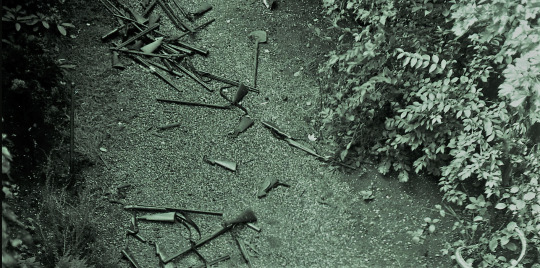
View On WordPress
0 notes
Text
so the incoming Dutch government has (among others)
a prime minister who is not a member of a political party but basically just someone who knows the right people to get him a nice job, former head of immigration and naturalisation services
a health minister/deputy PM who used to be a member of a white power/neo nazi forum and strongly opposes late term abortion.
a minister in charge of trade and international aid (as in aid sent to other countries from the Netherlands) who wanted to cut that aid significantly or even get rid of it altogether to pay for a hair brained plan to lower health insurance costs here a few years ago, who is (or was i'm not entirely sure) a board member for an even more racist and unhinged Dutch version of fox news, believes in some ass backwards conspiracy theory that the "elite" are trying to "replace" the population with non white/non western (Jewish!) people but claims that is not nazi rhetoric but a "factual description of a demographic development" , pro zwarte piet (loooong story but basically she's pro blackface)
a minister of immigration who also believes in the replacement conspiracy theory, is also racist, has referred to Islam as despicable. She's been called out on spouting nazi bullshit and just went "it's possible it's a nazi thing, I don't know, I don't really care/think about that"
a speaker of the house who also believes in the replace conspiracy theory and has mentioned it several times as an mp. He also complained about being sick of talks about slavery when there was a discussion on whether or not the (then) prime minister and the king should officially apologise for the Dutch slavery history. July 1st is Keti koti in the Netherlands - which celebrates the end of slavery and remembers those who lost their lives during it (kind of like Juneteenth in the US) and there is an 'official' celebration/memorial service in Amsterdam where normally at least some politicians would show their face and speak. The organisation has said they don't want Bosman (that's his name) there because he's a racist asshole. He's planning to go anyway.
an MP who blatantly denies there is famine in Gaza and says 2000 aid trucks enter the Gaza strip every week.
the leader of that ^ gang who is bffs with Viktor Orbán (Hungarian PM) and the American republicans (that should tell you enough), who was going to make sure there would be 'less Moroccans' in The Hague after winning local elections there, has insulted Islam on various occasions throughout the past 20 or so years, and wants to ban people from having dual citizenship except that one guy in his own party he kinda forgot about
The daughter of an immigrant who opposes immigration and wants to stop people from bringing their family here when they've officially been told they can stay. The EXACT same law that allowed her father to bring her and her mother and siblings here after he left Turkey when she was a kid. She also claims hundreds of thousands of people do this every year - which is bullshit, but she 'didn't do it on purpose' so it's ok.
a minister of housing who actively opposed building plans in her city. And also who nobody takes seriously because she got kicked out of her old party for openly criticising their covid policies during lockdown. Comedians love her because she says stupid shit all the time that they can use to make fun of her.
the leader of the farmers party who can't do maths, won't let anyone run the numbers on her party's plans because it's "not important what things cost or how they'd be paid for"
So yeah - the country is going to shit!
#the netherlands#dutch politics#dutchblr#nederblr#nederland#i just had to get it out#but god it's depressing when you write it all down like this
9 notes
·
View notes
Text
i love being southeast asian.
despite whatever unhappy history, despite the rise of ethnonationalism and racism in our countries; despite the fact that most of us remain in the global south under the invisible thumb of western empires and conglomerates, exploited by rich expats and beg-packers; despite the conservatism, the bigotry, the pain and prejudice and the corruption.
despite all that, i love where i am from. this is my home.
my hands tenderly trace the lines of our history and find within it a colourful collection of influences that continue to shape us until today:
the native malays, javanese, sundanese, minangkabau, bugis, visayan, tagalog, and other dominant peoples.
alongside indigenous tribes like the iban, kadazan, sama-bajau, temuan, penan, jakun, and hundreds upon hundreds more ethnic groups.
all of us holding onto our ancestors' mysticism and spirituality and animism, the watchful gaze of legacy fixed on us as we move through an ever-changing and modernising world (and what is modernity anyway? isn't civilisation overrated?).
and then the chinese peoples. the hainanese, hokkien and cantonese and more, many of whom came here due to trade in the pre-colonial era, but then most arrived as the imported labour for the colonial powers.
but this is their home too. we live here together, and through them we all celebrate lunar new year and the mid-autumn festival. all of us give red envelopes during our many festivals. we give oranges that symbolise prosperity and ring in the year of the rabbit, dragon, snake, horse, goat. we hold lion dance performances in our malls and marks. we eat and exchange mooncakes.
and then the indian peoples, though mostly tamil indians from south india, but also sikhs, malayalis, and punjabis, who arrived and assimilated and spread their culture and beliefs much earlier before the pre-colonial era, causing the indianisation of southeast asia. then more indian peoples came during the colonial era, again, as imported labour, working our fields or donning the uniform of our common oppressors, kept walled away from us despite how alike we look and sound.
because truly we do sound the same. sanskrit remains an abundant source for a large chunk of our languages. i hear the vedic mantras and can pick apart words that sound familiar. hinduism and buddhism still leaves its traces in our cultures even for those of us who've shifted to islam.
and yes, islam. we're not what the west thinks of when they talk about the muslim world, but southeast asia has some of the largest muslim populations in the world. because through trade, since the medieval times, islam came here and with it brought so many arabic influences that has come to shape our languages and customs, with plenty of our cultures having since been morphed around islamic beliefs and ideas. in malaysia and indonesia and brunei (and perhaps even certain parts of the philippines) you'll find a mosque or a prayer room everywhere you go. and every ramadan millions of us fast, every eid all of us dress up and visit each other's houses for feasts and festivities.
then of course came european colonisation at the hands of the portugese, dutch, british (in malaysia and indonesia's case we got all three), spanish, and french their reigns lasting over 400 years. and from them we came european culture and more new languages, english quickly becoming a second language (or even a first language) for so many of us, missionaries building churches and spreading the word of jesus christ as the son of god; with their fair features they draw a line between us and them, between the civilised and the barbarians, between the light-haired light-eyed and the unruly dark-haired dark-eyed.
and then comes world war 2 and the japanese invasion, and for most it was so brutal and violent, and for the rest it was miserable, with famine and inflation but we were forced to sing songs in japanese anyway, to watch their planes fly in the sky towards their enemies, to swallow their ideas in our parched throats.
and then the war ended and wounds began to heal, and then came the 1980s until now with all its shiny technology: nintendo, panasonic, television and anime, and now we have leagues of people learning japanese language and culture anyway, except now it is done wholeheartedly, and as it turns out japanese isn't even that different from our own cultures anyway. houses on stilts made of wood with thatch roofs, making our living from the sea and coast, eating rice for every meal, our phonetics and theirs so alike.
and today we have waves of their expats migrating here because of course they do, we're the Global South™ and for them it's cheap and affordable, so we have little japans sprouting here and there and sometimes i go to a random street and find signs written in japanese and read bits of broken hiragana.
and it's beautiful, being able to move through this world and find the handprints we've all left upon it. it's a wonderful amalgam of so many traditions and colours and beliefs and language all mixing around in this huge bubbling melting pot.
and i'm not chinese or indian or arab or british but when i see them on tv, i'm also seeing a part of me, i hear the words in their tongue and i recognise them as mine, i eat their food and know them as intimately as my own.
but of course our politicians, our kings and our prime ministers (and the divide-and-conquer rule of colonisers now gone) continue to divide us and make us hate each other, fanning flames of distrust and fear of that-which-is-different.
it's such a shame too, because it's so special. it's what makes us us, our dozens of creoles, the way we can speak a sentence comprising vernacular from at least four languages and we all understand each other anyway.
we have a word in malay, "rojak", which is also the name of a dish that mixes a bunch of different ingredients, and is found in malaysian, indonesian and singaporean cuisine. but where i'm from, we also say "rojak" to mean anything that's an eclectic mixture of things, things that seemingly don't go together and aren't necessarily pleasing to the eye but still, somehow, it works, in fact it tastes good, spicy and flavourful and hearty.
and that's us: southeast asia, all of it, a beautiful rojak culture. and it's ours.
#writeblr#people of color#writers on tumblr#writers of color#writing#southeast asia#asian culture#i woke up today and started feeling so many things. i looked around and felt full of love.#but i go on social media and it makes me angry and sad to see how much everyone hates each other#my love is not for what it is but what it could be#lots of my friends wish they could leave. emigrate to australia or UK or US. but even if i could i wouldn't.#this is my home. there is nowhere else.#when i was teaching and i saw those kids' faces it cemented it for me even more.#like if not for anything else i'll stay. i'll do it for them. carve out a community for them. for us.#shut up haydar#scribblings.txt
12 notes
·
View notes
Text
my OCs
updated since the last time i did this

Edrick
Nekomata x Werecat
Born at the tail end of the Edo period near present-day Tokyo (Japanese nekomata mother, white Dutch werecat father.) Watched his parents get murdered and had his sister die in his arms all as a very young child. The majority of his childhood was spent in a brothel, suffering severe and prolonged abuse.
Total masochistic, mental basket case with a good heart who is absolutely head over heels for his morally questionable husband Cole, a sluagh who escaped the wild hunt and snatched a body. He is drugs, sex, kink, and violence incarnate. You’d be hard pressed to find something he’s actually ashamed of. He’s almost always right on the edge of a total mental collapse from nearly two centuries of untreated, severe mental illness mostly brought on by heinous and extreme childhood trauma. You never quite know if he wants to stab you or fuck you. Maybe both. He’s chilled out (slightly) since he and Cole moved to the quiet of Donegal, Ireland with Cole's best friend, Lucky, from before his death.
Though Donegal isn't the bustling city life Ed had grown accustomed to in the States, it isn't without its own excitement and trouble.
Paired with: Cole, Lucky (both played by my partner)
Shares continuity with: Jess, Lune

Jesse
Werewolf, natural born
Massive, beefy, looks like he could rip your head clean off your shoulders, but is actually just one gigantic softie. Born during the famine, his parents fled Ireland for the States and went west where they encountered and were adopted by a large pack hidden deep in the desert canyons. He grew up only knowing their culture, which was similar to the Diné tribe the pack originated and were allied with. Ended up becoming pack leader, but his tenure was cut short when hunters ambushed the pack and massacred all but him; pups and expecting mothers all, including his mate-to-be and their unborn child. After some time spent trying to heal and cope in various unhealthy ways, he fled to his parents home of Ireland, hoping maybe to find answers to all of the pain.
Despite the sorrow and guilt that plague him, Jess has remained a tender and kind soul. He's a polite, old school gentleman. Quiet and reserved but amongst the first people to offer help. Just a simple landscaper and gardener who’s been hidingliving in Sligo, Ireland for the last few decades, alone. With severe body dysmorphia, riddled with PTSD, and an alcoholic who often relapses, he had completely shut himself away from intimacy in any form. Until recently, when the light of his life came crashing in to chase away the dark.
Paired with: Russ (played by my partner)
Shares continuity with: Ed, Lune

Lunetta
Werewolf, natural born
inactive
Bluntly honest, bitchy, and aggressive, but fun and flirtatious. She’s never really fit in that well and is still trying to “find herself” in a way. Without memories at the moment, she’s just trying to figure out her past and wtf happened. She’s very much “one of the boys” while also bringing the sex appeal.
Shares continuity with: Tristian(Alternate version of her), Jess, Ed

Tristian
inactive
Werewolf, natural born
The sweetest and gentlest goodest boy ever. Completely and totally submissive in every aspect of life possible. He only wants to please people, have a good cuddle, and do some zoomies in his wolf form. He’s a thrall in the setting he’s played in, but doesn’t mind it all too much as he’s been one for most of his life and doesn't know how to properly care for himself without a master besides. Comes loaded with some severe physical and mental trauma from past sexual abuse, but he’s a bouncy ball of sunshine despite it.
Shares continuity with: Lune
4 notes
·
View notes
Text
Pinned post for reasons:
Why make this post
Bunch of reasons. Mostly bc I currently have a lot on my mind
Who are you?
Fire(flower)(sims); a simmer whose most popular posts are about international events for some reason
Full legal name, age, address and credit card details?
Haha no
For which games do you create?
Sims Medieval of course! (just kidding).
No, I create for the Sims 2 and Sims 2 only.
Aren't you part of Sun&Moon?
Yup. I mostly do coding, optimization and localisation stuff.
Why is a simblr posting about politics and news sometimes? I came here for pixel people, not flesh people!
Sometimes rl news and crap just gets ya and you gotta release those emotions. Politics? They're unfortunately pretty inescapable. Also tumblr is often so US-centric, someone has to post about things affecting Europe too.
Why do you have opinions on the Israel/Palestine situation?
Because I think that shutting off people's access to water, food, electricity and medicine and then bombing their housing and killing civilians is a crime against humanity. Not to mention the whole colonization aspect. Also, my grandfather lived through the Dutch winter famine of 1944 and I do not wish the trauma he got from that on anyone.
Why aren't you (more) active?
RL shit. I have a job that takes up a lot of time and energy. Rn my dad has a type of cancer that is both relatively rare, difficult to treat and a high mortality rate to boot, very stressful to say the least. Insert wayyyy more shit besides that.
You're a metalhead? What type of metal? Got any recommendations?
Folk metal, black metal and death metal for the most part atm. But I also listen to other subgenres. Do ask me about cool songs, albums or artists I've been vibing to. I'd love that. (I need distractions)
Folk metal? Black metal? You some nationalist or alt-right wackadoodle?
There are things I like about my country and things I absolutely despise about it. I do not believe anyone's religion or ethnicity makes them inherently superior to others, so no: I'm no nationalist alt-right wackadoodle. If anything, I'd call myself anarchist-leaning. I just got into metal via blackened folk metal, that's all.
Ew politics
Yeah, agreed. Politics ew, yucky stuff
When are you going to be posting sims stuff again?
Difficult to say. When I have time, when I have energy. I do have a whole lot of stuff I want to finish up and post.
Hobbies
Sims, sleeping, cooking, music, travel, doing weird stuff for shits and giggles sometimes
What languages do you speak?
Depends. Dutch natively, Low Saxon ??? (It's complicated), English fluently. German and (EU) Spanish decent enough but fluctuate depending on how often I get to use them.
A bunch of others to various much lower levels. Just bc I can conjugate some verbs, string together a sentence or two or know some words, doesn't mean I can have a conversation or understand anything beyond "hi, yes, thank you, bye"
What do you do irl?
Internet stuff. You're not gonna get anything more specific. It describes it perfectly.
Fandoms?
Wouldn't you like to know
Will this post or your awful theme ever be modified?
Probably and possibly. We'll see
END
#pinned post#fire flower speaks#making a pinned post bc I really don't feel like doing much social media rn
6 notes
·
View notes
Text
@oligopsoriasis I don't know if you're still interested in the farming thing, but, regarding your land efficiency vs. energy-efficiency thing:
My impression is that, when designing an agricultural system, the basic trade-off is labor against land area, i.e. you can reduce labor inputs by using more land and reduce your land footprint by sinking more labor into it.
In this framing, I think industrial row-crop monocultures are extensive rather than intensive, i.e. they sacrifice land to save labor as well as/rather than energy to save land. Sustainability and higher absolute production might well not mean using more land.
A lot of the articles and papers that talk about modern sustainable systems trumpet them as Actually Much More Efficient than “industrial” agriculture, when, really, they’re just opting for the other end of the ancient trade-off -- they lead with productivity statistics calculated entirely on land use, and quietly note somewhere down below that “of course, this takes vastly more work, and is devilishly complicated to maintain...”
But that doesn’t mean they aren’t a better bet! The point is, there are trade-offs to be made other than technology-i.e.-what-we-have-now/primitivism. It means we’d need more greenhouse-minders and algae-scrapers, yes, maybe even more people growing beans in raised beds, but that’s Jobs, not a return to peasant agriculture.
(I’m not really considering the original thing about hunting, meat just doesn’t seem likely to ever be efficient, except on marginal lands, where it couldn’t support modern population densities, alligators or no.)
[some rambling speculation about historical intensive systems:]
Anyway, historically, intensive, labor-heavy, small-land-footprint systems make sense if you have a lot of labor and not a lot of land, and include the various clever Native American polyculture systems (the chinampa, the three sisters), but also potato-farming (Ireland, before the famine, being prototypically labor-rich and area-poor: a densely-populated, highly fertile area in which people had to subsist on glorified garden-plots), modern Dutch-style greenhouse fruit/veg/cash-crop cultivation, maybe what the Cubans do. Wet rice cultivation and terrace-farms are possibly in this category. “Vertical farming”, if it’s not a nothingburger, probably will be too (multistory buildings are capital, capital is dead labor, lotta walking up stairs, etc.).
(Classic Geertzian involution is when you can’t get any more intensive, so you have to sink more people, more bodies, more hours into it, without hope of improving productivity per head.)
My conjecture is that intensive systems make more sense when you don’t have draft animals to give you access to a larger area and incentivize more drivable open layouts and planting/harvesting techniques.
#politics#history#agriculture#edited bc it sounded like the last paragraph was referring to involution#rather than intensive agriculture
81 notes
·
View notes